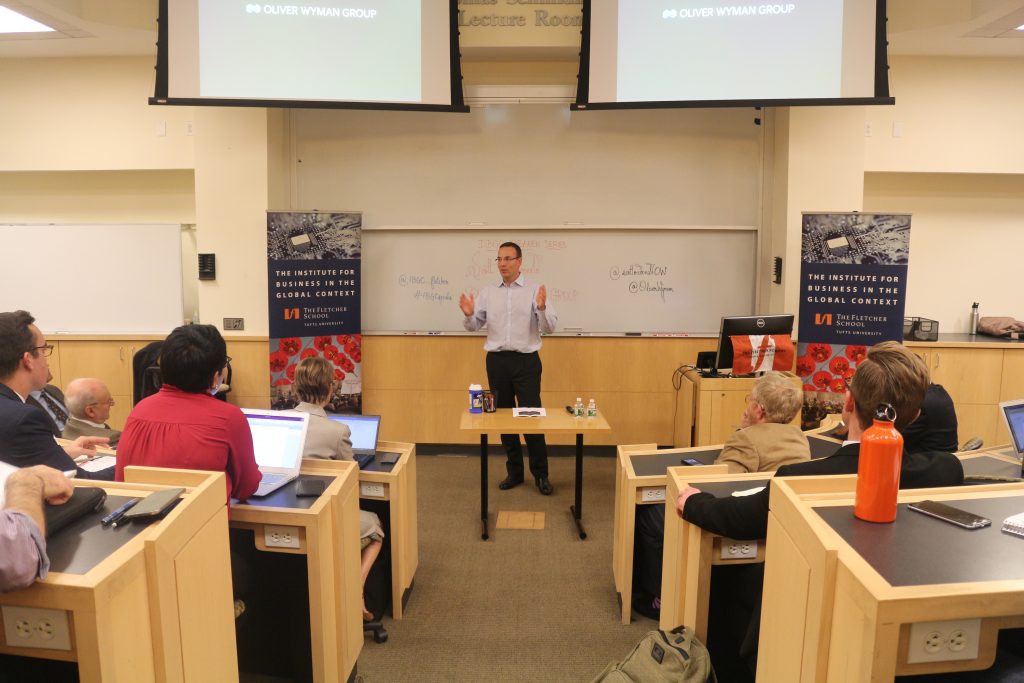Oliver Wyman CEO Scott McDonald Addresses Business’ Role in Politics
“Should businesses be involved in politics? Absolutely. We have a responsibility to make our contribution to society,” Oliver Wyman CEO Scott McDonald told Fletcher students last week during a talk hosted by The Institute for Business in the Global Context. McDonald explored business’ ever-evolving role in politics during his presentation and explained how he navigates the changing landscape as head of a leading global management consulting firm.
The debate around whether business should (or shouldn’t) be involved in politics isn’t a new one, McDonald said, but discovering the right way to balance involvement in politics without alienating your employees and consumers often poses a challenge for companies.

Political activities such as lobbying have existed for ages and have always been a natural part of the business world, McDonald explained. During the 1960s and ‘70s, businesses became more involved in politics as the civil and women’s rights movements hit the scene. The next big wave of activity popped up in the ‘90s as consumers began to make their voices heard more clearly. Over the past 10 years or so, companies have started to think strategically about consumers’ voices and have begun to actively align their goals with those of their customers.
With this wave of consumer activism, CEOs have started to become social activists to a degree not before seen since their customers and employees have begun to pressure them to become involved with various social issues. “There are now businesses being designed around the whole social system,” McDonald explained. As CEOs begin to comment on various social issues in the public eye, though, it can often create confusion among a company’s employees and consumers as they try to discern what the CEO’s motivation is for speaking out.
While McDonald has realized what works for his company in terms of striking this careful balance, it wasn’t always smooth sailing. He shared a few personal stories that exemplify some of the challenges he faced along the way. For instance, he discussed a report Oliver Wyman created that explains how complying with certain climate change regulations can negatively affect employment rates. When President Trump pulled out of The Paris Agreement, he used this very report to justify his decision, and McDonald experienced major backlash. “I had an enormous uproar across Oliver Wyman,” he said.
He proceeded to research why his company had done the report in the first place, and realized it had been undertaken on behalf of a think tank, and didn’t necessarily represent the company’s opinion as a whole. McDonald then sent a note to the company to explain the report’s background in depth, yet many people still accused him of using Oliver Wyman to share his personal views.
Another story McDonald shared involved Oliver Wyman’s work with refugee causes. “I have a real passion about refugees. I think it’s one of the defining issues of our time and we’ll be judged in our future by how we address it now,” he said. As McDonald witnessed the global refugee crisis worsen over the years, he wanted his company to do something to help. He decided to write an editorial stating that Oliver Wyman would hire refugees in order to “motivate all the countries that read the article to act in similar ways.” What McDonald didn’t expect was the great hostility he was about to generate throughout his company. With unemployment issues rampant in their own country, Oliver Wyman employees weren’t happy about the idea of offering extra jobs to refugees. “I quickly realized this was a complicated issue,” he explained.
McDonald shared these two stories as a small snapshot into a day in the life of a CEO and how they must constantly strive to balance business with politics. After all, companies answer to a range of people — shareholders, customers, suppliers, employees — and at every level, people have a range of concerns. “Life has become much more complicated,” McDonald explained. And often, it’s hard to predict the value of speaking out in the public eye versus the consequences.
In the grand scheme of things, most causes that businesses undertake are pretty minor and safe, McDonald said, but he sees that changing. “I think we will move even further into an era where businesses are doing an enormous amount of work on various social issues,” he predicted, adding that it’s become necessary for companies to build this type of work into their business model.
“I started life in business as more of a purist…I no longer think that way,” he said, arguing that businesses can’t just “stay in their lane” anymore. “I’m all for businesses getting more involved [in politics] within a much more disciplined framework that we don’t have now.”
